RV side Trip: Ride a Covered Wagon Aong the Oregon Trail
The Oregon Trail, and the ancillary trails that led from it, constituted the single greatest migration in America – as many as a half a million men, women and children who traveled by wagon and by foot west for two decades in the mid-19th Century.
There are lots of books on the trail and lots of academic experts. But when it really comes to knowing the trail and experiencing it, there are few who can match Morris Carter.
Morris Carter has not only built wagons that replicate those used by the pioneers, he’s actually made the 2,600-mile wagon train trip himself, from its start in Independence, Mo., to the final destination in Oregon’s Willamette Valley. That 1993 trip was followed by a similar trip in 1999 along the 2,500 miles of the California Trail.
Others may have read the books and journals of those original pioneers, but Carter – who has also read them all – has done it. Really done it, in a wagon pulled by horse along the same routes used by those who settled the west.
And today, from his home in Casper, Wyo., he leads modern-day wagon trail excursions whose route literally parallels the still-visible ruts left by those who traveled the Oregon Trail 150 years ago.
His trips range from four hours to overnights and week long trips, with those who travel with him staying overnight in Tee Pees, fed Wyoming steak dinners around a campfire and regaled with Carter’s encyclopedic knowledge of what it was really like to make the trip, which typically took six more months.
Here’ a video I did of the covered wagon trip.
Jennifer and I tagged along on a tour. I hopped in and out of the wagon, taking photos and shooting video. Carter’s daughter, Oneida, who accompanied her father on the full-length Oregon Trail trip in 1999, expertly handled the two draft horses. The trip was booked by a family of four from Oklahoma, Mark and Nikki, their 16-year-old daughter Rebekah and seven year old son, Blaney.
“There are a lot of misconceptions about the Oregon Trail,” Carter told me. “It wasn’t just one wagon most families took. It was two or three. They took everything they had to set up and furnish their new homes in the west. And the trail was usually crowded. The string of wagons often stretched out as far in front and in back as you could see. The wagons would be sometimes 10 across. They’d average two miles an hour when pulled by oxen, maybe four if by horses.”
As I walked along taking photos, he repeatedly warned me to watch for rattlesnakes. I didn’t see any. Thankfully. “They’re all over out here,” he said. “Fortunately, they’re watching for you, too.”
No wonder Jennifer decided to stay in the wagon.
In the original migration, most people walked, Carter said, making it easier on the animals. “Some walked the entire way,” he said. “many were barefoot.”
The biggest danger was accidents. Falls off wagons, under wagons, being tramped or kicked by a horse, snakebite. Disease was widespread, especially cholera. There was a saying the pioneers had about the thousands who died from the virulent intestinal disease: “Healthy at breakfast, in the grave by noon.” Indeed, as Jennifer and I have visited various spots along the Oregon Trail from Missouri westward, we have seen several grave sites of pioneers who died along the trail of the disease.
There were also Indian attacks. One wagon train was wiped out just a couple of miles from the route we traveled. That same band of Indians also killed an entire cavalry platoon sent out to protect the ill fated wagon train.
What amazed us as we rode the wagon across the countryside was how hilly it was. The tall prairie grass makes it look flat and smooth from a distance. Up close, it is a bone-jarring bumpy ride that constantly seems to be rising and falling.
At camp, we joined the family for dinner, steaks grilled over a campfire, baked potatoes, rolls, green beans and bacon, and cherry cobber baked in a Dutch Oven. As they retreated to their Tee Pees after dark, we went to our Roadtrek Etrek, which we had driven out to the prairie campsite.
In the morning, I took photos of the replica of the original two-horsepower covered wagon next to my modern covered wagon with diesel power.
Over coffee that morning, before the guests left their sleeping bags in their Tee Pees, Carter told me he was looking for help in running his expeditions and though a workcamping RV couple would be perfect to help drive the wagons, care for the horses and prepare the meals. He has full hookups on his property. I promised to put the word out….. which I just did.
The trip was one of the most interesting and enjoyable things we’ve ever done. The prairie is beautiful, even when dark clouds bearing lightning and a sudden downpour swept down over the mountains. It has a vastness about it, like the ocean, spreading out wide and full beneath a big sky that bottoms out against a range of low lying mountains. Antelope bound over the little grass hills, eagles float overhead.
I’d highly recommend the experience though you need to be in half way decent shape without back or neck problems. Those wagons are pretty bouncy and riding a horse for extended periods of time does require a basic level of physical health.
With daughter, Oneda, driving the wagon, Morris Carter (right) rides alongside. The wagon is on the original Oregon Trail, the ruts of which can still be seen on the Wyoming prairie.
The Wyoming prairie is stunningly beautiful.
Rain sweeps towards us from distant mountains as the sun still shines in the foreground.
Morris Carter
Jackie, who works with Carter, made a campfire steak dinner.


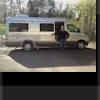
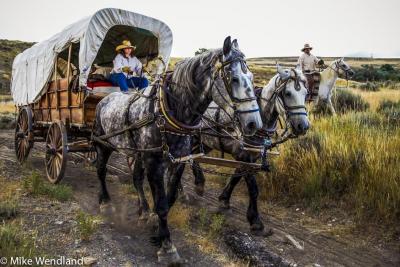
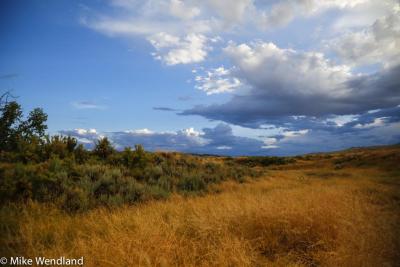
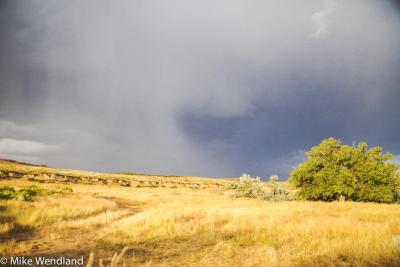
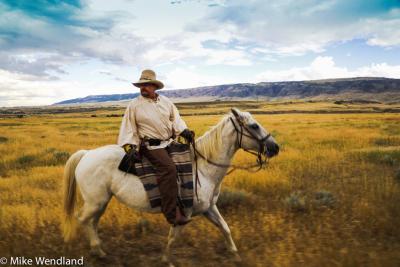
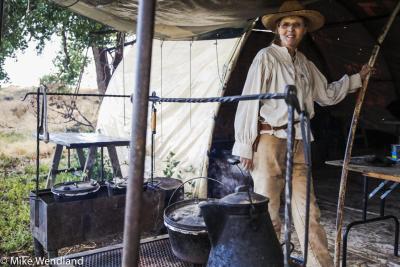
0 Comments
Recommended Comments
There are no comments to display.
Please sign in to comment
You will be able to leave a comment after signing in
Sign In Now